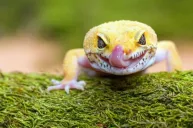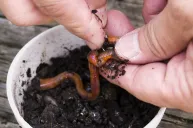When thinking of ways to stop pollution most people think of things like solar panels and recycling. However nature may have just provided us with a solution of its own. Scientists have discovered a worm that eats plastic. Could this be the answer to our plastic pollution problem?
Bye Bye Pollution: Scientists Discover Worm That Eats Plastic

Getty Image
The issue of pollution has been plaguing our planet for years, and it seems scientists may finally have found the solution. The journal Nature details a worm that eats plastic. The NY Post reports "the larvae of a lesser-eating Kenyan mealworm can digest the ubiquitous pollutant, making it the only insect species native to Africa that has been shown to do this."
Scientists are now studies these plastic-eating mealworms to see how they could potentially aide the pollution problem in the world. Fathiya Khamis, a senior scientists at the International Centre of Insect Physciology and Ecology admits that they hope to gain useful insights from these worms. She admits that by studying these worms that eat plastic, she is hopeful they can learn how to develop tools that will help eliminate plastic waste.
Additionally, these worms are not only good at eating plastic. They also possess "enzymes that can break down polystyrene" which happens to be the main component in styrofoam. While traditional pollution efforts have good intention they typically tend to be costly and actually increase pollution.
However these worms that eat plastic and styrofoam could be the answer we are all looking for.
Scientists Study The Gut Bacteria Of Worm That Eats Plastic
To further understand the worm that eats plastic, scientists conducted several studies. In one, they studied the gut bacteria of the mealworms. The worms were fed "either plastic polystyrene alone, bran alone, or a combination of both." Surprisingly, the worms that ate the polystyrene-bran diet "consumed polystyrene more efficiently than those on a polystyrene-only diet."
Additionally, they survived at a much higher rate. Those that were able to successfully break down the plastic had higher levels of a certain bacteria in their guts. Scientists are considering to study the worm's gut. microbiomes. While they could release thousands of these worms, it is not the practical solution. So for now, they continue to study and learn, and hopefully one day soon will have a way of reproducing these enzymes and solving our plastic pollution problem.




